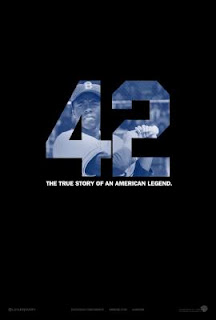MPAA (PG-13) CNS/USCCB (A-III) RogerEbert.com (3 Stars) AVClub (C+) Fr. Dennis (4 Stars with Expl)
IMDb listing
CNS/USCCB (J. Mulderig) review
RogerEbert.com (R. Roeper) reviewAVClub (S. Tobias) review
42 [2013] (screenplay and directed by Brian Helgeland) runs in good part like an good old-fashioned, supremely family oriented baseball movie. (Both Jackie Robinson [IMDb] and similarly baseball/cinema legend Lou Gehrig [IMDb] would be proud). As such, some viewers may initially find the film "kinda hokey." But then on reflection I do believe that the film was _intended_ to be that way.
I say this because I find the film to be intended to be challenging on multiple levels:
On the most obvious level, the film reminds us of a time when blacks (seriously) could not play professional baseball in the United States SIMPLY BECAUSE THEY WERE BLACK. Today, this seems so utterly foreign to our common experience. However, up until Brooklyn Dodgers owner Branch Rickey [IMDb] (played superbly in "good ole fashion baseball movie" fashion by Harrison Ford) simply found continuation of that state of affairs to be insane (and FRANKLY AGAINST HIS METHODIST (CHRISTIAN) UPBRINGING) segregation in professional baseball was a reality. And I know that there will continue to be some white viewers who will resent the film's bringing-up of this rather embarrassing aspect of American history. After all, the two, Rickey/Robinson, desegregated baseball ONLY AFTER WORLD WAR II. African American Olympic star Jesse Owens [IMDb] was considered a hero in 1936 for sticking it to the Nazis (and their Aryan race-based delusions) at the Berlin Olympics. But it took until 3 years after the still SEGREGATED U.S. ARMY along with the Russians on one side and the British on the other CRUSHED NAZI GERMANY in 1945 that an African African baseball player was allowed to swing a bat for an American Major League Baseball team ...
But putting this obvious aspect of the film aside, the film also underlines aspects of 1940s era Baseball that OUGHT TO CHALLENGE and SHAME Professional Sports today as a whole and the individuals (athletes, coaches/managers and owners) as well. After all, Jackie Robinson [IMDb] (played again superbly for this kind of the film by Chadwick Boseman) was portrayed AS A FAMILY MAN who married his Pasadena, CA hometown sweetheart Rachel (played again superbly for this kind of film by Nicole Beharie). Imagine a ballplayer TODAY who's portrayed as WITHOUT QUESTION FAITHFUL TO HIS WIFE AND FAMILY.
To underscore this film's challenge to the both on and off-field moral failings of today's professional sports, a side plot in the film involved Branch Rickey having to have to let go of his manager just before the start of the tumultuous 1948 (Jackie Robinson starting) season on account of pressure on Baseball's commissioner BY THE NATIONAL CYO (Catholic Youth Organization) because the Dodger's manager was having an adulterous affair with a Hollywood starlet. Honestly, could anybody today imagine a coach or manager of a professional sports team being pressured to resign (or as in the case here, take a year's suspension) for simply having "slept around" with a model or actress? Today, adultery in Professional Sports is taken as "par for the course." We've all heard media commentators shaking their heads, perhaps with some sympathy but certainly with resignation, saying of cheated-upon athletes' wives: "Well, you know, SHE MARRIED A BALL PLAYER. (What do you expect?)" Well in the 1940s, it was still largely expected that ball players and all those associated with Professional Sports would "play by the rules" set for everyone and to be faithful to their wives and kids. (Yes, I know that Babe Ruth [IMDb] was a legendary womanizer but (1) perhaps he was the single exception who could get away with that behavior at the time ("he was Babe Ruth...") and (2) without a doubt, in that regard, he was considered a bum by the American public. Certainly the celebrated Yankee considered of much higher moral caliber was Lou Gehrig [IMDb]).
So then this film, which chronicles the struggles of Jackie Robinson [IMDb] and Dodgers' owner Branch Rickey [IMDb] to finally break the racial barrier in professional sports in the United States, ALSO offers a challenge to American sports and society today. For Jackie Robinson [IMDb] was not portrayed here as merely a "great baseball player." He was also portrayed as a good man.
<< NOTE - Do you like what you've been reading here? If
you do then consider giving a small donation to this Blog (sugg. $6
_non-recurring_) _every so often_ to continue/further its operation. To
donate just CLICK HERE. Thank you! :-) >>

The story is compelling. The acting is good and the historical period, including the old ball parks, are recreated very convincingly. The baseball scenes are well done. :)
ReplyDelete